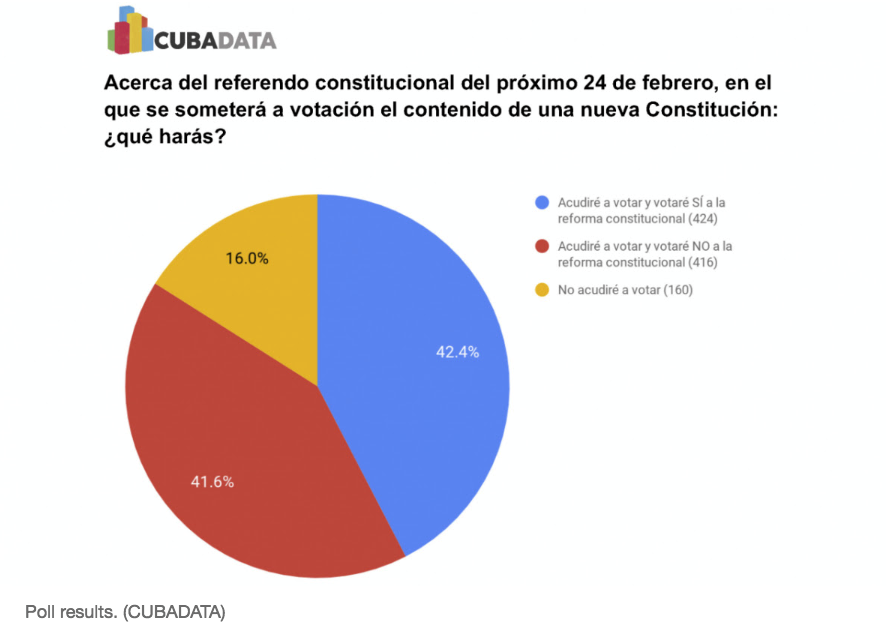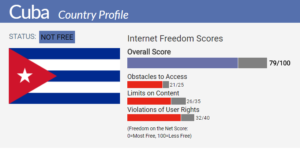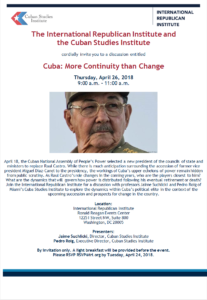
Center for a Free Cuba
Cuba‘s Communist regime is tweeting, but that does not mean it is more tolerant of dissent, despite attempts to cultivate on-line dialogue with citizens, the Economist reports:
Lately, though, the conversation has turned angry. The ill-will arises from the government’s attempt to enact a new constitution through a referendum to be held on February 24th. It would make modest changes to the existing constitution, such as legalising private property (subject to regulation by the state) and limiting the president to two five-year terms. Tempers flared after the national assembly announced in December (by tweet) that a provision allowing for same-sex marriage would be dropped. In its place is a fudge that would recognise marriage as a “social and legal institution”, to be defined later.
The new constitution may rein in rights further, one analysis suggests, citing five ways that the Cuban Communist Party has failed its people.
- Restricted expression
- Economic stagnation
- Unfair working conditions
- Limited access to information
- Artistic censorship
 “It’s a sham. The Communist Party remains the centre of everything,” says artist Luis Manuel Otero Alcantara in reference to Sunday’s referendum on reforms that are supposed to open a new post-Castro chapter in Cuba’s history.
“It’s a sham. The Communist Party remains the centre of everything,” says artist Luis Manuel Otero Alcantara in reference to Sunday’s referendum on reforms that are supposed to open a new post-Castro chapter in Cuba’s history.
The new version keeps the Communist Party as the only legal party and maintains its role as the guide of the nation, stating that this is irrevocable, Reuters adds:
Government opponents have blasted the top-down process as a “fraud” and the referendum as “illegitimate”. They say that since the final version was approved the government has used its monopoly over the media and most public space to campaign for ratification while censoring other points of view and harassing dissidents.
In spite of government repression and abuse of its media apparatus to promote approval of the new Constitution, a CubaData survey (above) reveals that only 42.40% of respondents support the new constitutional text, while 41.60% are willing to vote “No” in the referendum, and 16% will abstain, the Center for a Free Cuba* reports:
Should these numbers be borne out, it would constitute a debacle for a Government accustomed to citing implausible figures of electoral participation and support. It would also constitute a dramatic spurning by Cubans of “irrevocable socialism,” the absolute power of the single party, the prohibition of a free press, and wide latitude for the prosecution of “treason,” all provided for in the new Constitution.
 The Cuban government stifles genuine political debate and civic participation among its citizens by implementing flawed and undemocratic electoral processes, resulting in a one-party system that prohibits diversity of thought or political pluralism, states the Bureau of Democracy, Human Rights and Labor.
The Cuban government stifles genuine political debate and civic participation among its citizens by implementing flawed and undemocratic electoral processes, resulting in a one-party system that prohibits diversity of thought or political pluralism, states the Bureau of Democracy, Human Rights and Labor.
These authoritarian measures inhibit constructive dialogue between citizens and their government regarding solutions to the country’s social, political, and economic problems, resulting in a failed system that leaves little hope for the Cuban people to enjoy true economic prosperity or personal liberty, it adds:
 This failed political system leads most Cubans to experience scarcity of basic food and medicines, crumbling electrical and transportation infrastructures, precarious housing, outbreaks of easily controlled diseases, and limited connectivity to other Cubans on-island or to the international community. Tight control of the nascent private sector and the criminalization of independent civil society organizations prevent most individuals in Cuba from organizing to enact the social, political, and economic solutions to improve their personal circumstances or realize their full potential, trapping them in a cycle of poverty and dependence on the State.
This failed political system leads most Cubans to experience scarcity of basic food and medicines, crumbling electrical and transportation infrastructures, precarious housing, outbreaks of easily controlled diseases, and limited connectivity to other Cubans on-island or to the international community. Tight control of the nascent private sector and the criminalization of independent civil society organizations prevent most individuals in Cuba from organizing to enact the social, political, and economic solutions to improve their personal circumstances or realize their full potential, trapping them in a cycle of poverty and dependence on the State.
DRL seeks Statements of Interest (SOIs) that support independent civil society organizations and Cuban individuals in their efforts toward the realization of the liberties enshrined within the Universal Declaration of Human Rights, the denial of which has resulted in the above-mentioned systemic failures. RTWT
*A partner of the National Endowment for Democracy.







